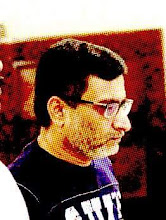That famous astronomer Carl Sagan would begin by telling that the
Cosmos is everything that was, everything that is, everything that ever will
be.
What is this Universe? Every day each one of us experience an
unlimited variety of events, things, people and places.
At times, we do ask, who really are we? what exactly is the world that
we see, perceive, experience, enjoy , love and hate. Natural Philosophers, from
the beginning of time have pondered over it. Everything has been investigated,
questioned, theorized, explanations attempted, debated till this day.
There is the infinitesimally small to the infinitely large scale of
things in this world. Time and space forms the two dimensions of the infinitely
large canvas on which an effervescent world is painted. There seems an infinite
past, and an equally infinite future, both seem vague, unsure and misty as we
move away from the NOW.
We somehow come to the conclusion that, what I see and perceive alone
exists. But what we perceive is so temporal, so transient. There was a time
when none of them existed, there is a time when they exist, and then there is
always a time when they no longer exist.
We investigate the world with our perceptive powers. Perception is our
only tool. I look at a thing, a stone maybe, I hold it in my hand, I perceive
its weight, its texture, its color, I look deeper, I observe its composition,
the patterns, the edges, the cracks, the ridges.
I now want a closer look, a magnifying glass comes to help. I can see
the finer details, I can see engaging patters of a finer degree. It appears as
if its been very carefully crafted. the stone's surface is coarser than it
appeared. I want to see more. I chisel a piece of the rock into a fine little
sheet, now I engage a microscope, there is a whole world in that small piece of
the rock. I can even see life, where I thought it was totally inert.
I look deeper, magnifying further, the cracks are really huge, the
ridges are real deep, am I looking at a mountain range, or a tiny piece chipped
off a stone? hard to tell. I go deeper,
more complex tools, I now take a tiny fraction of the chip, I can hardly see it
with my eyes, things become vague, I am not sure what I am really looking at.
For a moment I can’t go any deeper. I realize my most trusted tool for
perception, vision has reached its limits, it can no longer discriminate. Light
cannot help me see anymore! what’s happening! After all when I see a thing,
it’s the light bounced off that thing that I see. In fact I see only the impact
of that reflected light in my retina. Actually I see only the impulse the
retina sends through the nerves to my brain.
I am now looking at a scale so small, light cannot really help me
here! I get innovative, I use tiny particles, smaller than an atom, I shoot
them at my tiny object, and capture them behind. Based on what I receive it at
the other side, I "guess" what is in my object. I see interesting
things, the tiny little object is mostly empty. and at vast distances I see an
occasional particle. nothing in between.
I build more powerful, scarily humongous gadgets, to see deeper. the
more deeper I look, the more empty the object seems to be. No matter what my
object of observation is, the result is the same. I want to know what these
tiniest of the tiny little particles are. There is a garden of such particles,
scientists give them exotic names, quarks, bosons and what not. Now I forget
about the rock totally, I am interested in these particles. I want to
"look" at them. I really cannot look at them any more. I can only
guess.
My devices can only tell me such and such a particle may exist in a
given space. When the particle detector "looks" at "a"
particle, its gone! When it doesn't look, then a probability exists! The rock
solid world collapses into a probability. It can be seen only as mathematical
equations!
Sometimes I think the blind spot is a blessing, it helps me NOT to
see, and hence makes the existence a possibility.
Knowing this liberates me from endless conflicts that is the result of
me giving reality to this illusion.

